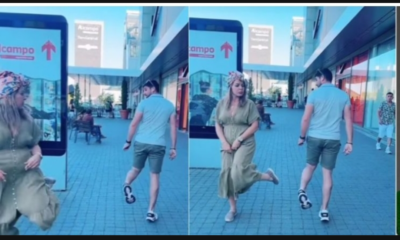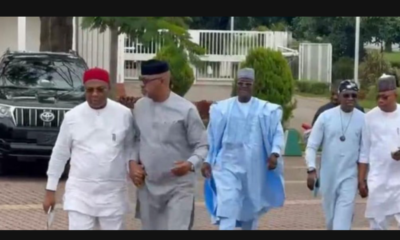News
No Going Back On Electricity Tariff Hike—FG
THE Nigerian Electricity Regulatory Commission, NERC, told the Senate yesterday that there was no going back on the implementation of the 45 per cent increase in electricity tariff already in progress.
According to NERC, the decision to increase the tariffs is to ensure that the power sector become revived, and that removing tariff will worsen the power problem in the country.
This was disclosed yesterday by the Minister of Power, Works and Housing, Babatunde Fashola and the Acting Chairman, CEO of NERC, Dr. Anthony Akah, when they appeared before the Joint Senate Committee on Labour, Employment and Productivity as well as Power, Steel Development and Metallurgy.
The Committees are chaired by Senators Suleiman Nazif and James Manager.
All the senators urged the federal government to put an end to rhetorics and put in place serious action that would provide electricity to Nigerians, adding that what Nigerians expected from the government of change was the provision of basic services as electricity.
Addressing the lawmakers, Fashola noted that only the NERC had the powers to fix tariffs in line with the law passed by the National Assembly.
He said as a minister, he didn’t do it and asked Nigerians to put behind them the past and move the country forward by keying into the agenda of the federal government.
Also yesterday, the Senate and organized Labour carpeted Electricity Distribution Companies, DISCOs and generation companies, GENCOs, over what they termed exploitation of the people and failure to provide services commensurate with the money collected from Nigerians.
Speaking further, Fashola explained that the regulatory power of the sector had also been placed on National Electricity Regulatory Commission, NERC, by an Act of Parliament, hence his job was to line up behind what NERC was doing.
The minister said he was in support of the hike in electricity tariff by the commission which came into effect three months ago and generated public outcry from Nigerians.
He said: “The real actor here is NERC, NERC is the only body by the law that you enacted that fixes tariff, not the minister, not the ministry.
‘’ That is the independence that we created since the electricity sector reform Act 2005. It was a landmark legislation, the more I read that legislation, the more I salute the parliamentarians who debated that legislation.
“Of course, every legislation is often times limited to the circumstance of those who made it. That is why there are amendments from time to time but up to last night, I still referred to that legislation preparing our rural electrification plan and the rural electrification form and that legislation seems to have addressed many things.
‘’Let me say again for the purpose of those who will benefit from this public hearing that today, there is no PHCN anymore and we must migrate because we have moved on from it.
“As minister, I inherited a power sector where government interest had been illegally sold and, therefore, I don’t control how power is distributed, I don’t control how power is generated as was possible to do in the past.
‘’They are now largely private businesses, except those where government now has some minority shares and so government is now minority shareholder in businesses where they are majority shareholder and we can only exercise collaborative pressure to get things done but things must be done now on a commercial basis.
“In the past, it was easy for government to manage the distribution access to say give power to the people, don’t collect money. It is no longer to do so because government is now a minority shareholder in this regard.
‘’Government control is limited and it is largely exercised regulatorily by NERC, NERC sets the tariff, so my interventions here would be largely to express why I support what NERC has done and to help amplify my understanding of it.
“The DISCOS were making it very clear to us that if we did not give them the market reflective tariff, it means that government would have to carry the continuing cost that accumulated in the region of about a trillion naira because tariff had been increased in 2015 and then reversed because of electoral significance.”
“We are not insensitive to Nigerians owing to their challenges. We were looking for the best way to solve what has become an over 60 years problem since 1950 when TCN was first created.
‘’This year, it was clear to us that if we did not take some of this decisions, we would continue to repeat some of the errors of the past and I guess tariffs may initially look excessive, but when we count and measure the down turns and how much time is lost when there is no sustainable electricity and measure them against the expectation of sustained electricity overtime, it would have been cheaper.’
“I will also say that power itself is a value chain as you must know but your constituents don’t know or some of them dont know and that is why you sit here so that they can also see that you are concerned as they are about how choices are made on their behalf in order to make their lives better.
“One of the reasons it has gone up was that a major component, a significant number of our power plant depends on gas.
‘’Out of about 26 power plants that we have, only about three are hydro. We were heavily dependent on gas, people were exporting gas because gas was selling outside the country at $4 and it was selling for domestic use at $1 per 30. Government reviewed that price to a total of $3 30.
At the public hearing yesterday, there was some a sharp disagreement between Labour and NERC over consultation prior to the coming on board of GENCO and DISCOS.
While the acting Chairman of NERC told the Senate that there was wide consultation with Labour, both the Trade Union Congress, TUC and National Union of Electricity Employees, N.U.E.E. said there were no consultations, and kicked against the new electricity tariff.
In his remarks, General Secretary, N.U.E.E, Comrade Joe Ajaero, who noted that they never met as nobody consulted them, said that as a body, it was worried that electricity which ought to be a social service, had suddenly becomes a commercial venture, adding that part of the problem was the citing of political gas power stations where no raw materials existed.
Represented by the General Secretary, Senior Staff Association of Electricity and Allied Companies, SSAEAC, Comrade Chris Okonkwo, Kaigama said: “ a 45% upward increase in electricity tariff at this point in time, with the challenges in the economy, has adversely reduced the purchasing power of ordinary Nigerians and slowed down businesses, including manufacturing. It is not justifiable.
“The distribution companies have continued to exploit Nigerians by estimated billing systems for the majority of consumers, while deliberately refusing to make pre- paid meters available. It is clear, therefore, that the 45% Tariff increase is an additional heavy burden on consumers and will have a telling effect on business especially manufacturing.’’
-

 Celebrity Gossip & Gist2 days ago
Celebrity Gossip & Gist2 days ago“When you talk finish, you hug transformer” – Yul Edochie tells Judy Austin’s ex-husband over his allegation
-

 Health2 days ago
Health2 days ago‘Stunning’ – Experts react to new twice-yearly injection that offers 100% protection against HIV/AIDS
-

 News2 days ago
News2 days ago“9ja to the Universe” – Oyinbo people raise eyebrows as they dance to viral ‘Gwo gwo gwo ngwo’ challenge (Video)
-

 News1 day ago
News1 day agoTinubu meets APC governors as nationwide protest against hardship looms (Video)









